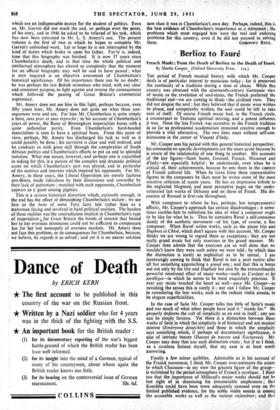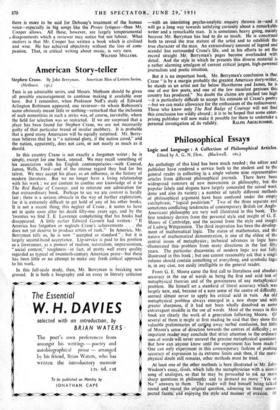Berlioz to Faure
THE period of French musical history with which Mr. Cooper deals is of particular interest to musicians today ; for it preserved the continuity of a tradition during a time of chaos. While this country was obsessed with the nineteenth-century Germanic view of music as the revelation of soul-states, the French preferred the traditional and—we are coming to think—the civilised view. They did not despise the soul ; but they believed that if music were written to please, and competently written, the soul could be' left to take care of itself. Of course French music had, in the Franck circle, a counterpart to Teutonic spiritual striving, and a potent influence it was. None the less Franck was eccentric to the French tradition in so far as professional academicism remained creative enough to provide a vital alternative. The two lines meet without self-con- sciousness in the career of Vincent d'Indy.
Mr. Cooper sees his period with this general historical perspective ; his comments on specific developments are the more acute because he is aware of the relationship of one thing to another. His accounts of the key figures—Saint Saens, Gounod, Franck, Massenet and -d'Indy—are especially helpful ; he understands, even when he is critical of, their achievements, because he sees them in the context of French cultural life. When he turns from these representative figures to the composers he likes most he writes some of the most sensitive criticism of recent years. He has an impressive tribute to the neglected Magnard, and most perceptive pages on the under- estimated last works of Debussy and on those of Faure'. His dis- cussion of Roussel is first-rate throughout.
With composers to whom he has, perhaps, less temperamental affinity, Mr. Cooper's approach has certain disadvantages ; it some- times enables him to substitute his idea of what a composer ought to be like for what he is. Thus he considers Ravel a self-conscious dandy of the aesthetic movement—of his type, of course, a fine composer. When Ravel writes works, such as the piano trio and Daphnis a Chloe, which don't square with this account, Mr. Cooper thinks we are wrong to regard them as exceptions ; they are not really grand music but only exercises in the grand manner. Mr. Cooper then admits that the exercises are so well done that we wouldn't know they were such unless we were told ; by which time the distinction is surely so sophistical as to be unreal. I am increasingly coming to think that Ravel is not a petit maitre after all but something approaching a grand one ; and that this is borne out not only by the trio and Daphnis but also by the extraordinarily powerful emotional effect of many works—such as L'enfant et les sortil?ges—in which he seems to be most exquisitely precious. If ever any music touched the heart as well—pace Mr. Cooper—as ravishing the senses this is surely it ; nor can I follow Mr. Cooper in considering the late works, such as the radiant violin sonata, to be elegant superficialities.
In the case of Satie Mr. Cooper talks too little of Satie's music and too much of what other people have 'said it "stands for." He properly deplores the cult of simplicity as an end in itself ; any one can be simply fatuous. Yet there is a distinction between those works of Satie in which the simplicity is of historical and not musical interest (Embryons dessichis) and those in which the simplicity says something which, if perhaps of documentary significance, is also of intrinsic beauty (Danses de travers and Nocturnes). Mr. Cooper may deny that any such distinction exists ; but if so I think, as a cautious Satiean myself, that my case is at least worth answering.
Finally a few minor quibbles. Admirable as is his account of the Franck movement, I think Mr. Cooper over-estimates the extent to which Chausson—in my view the greatest figure of the group— is victimised by the period atmosphere of Franck's mystique. I think too that the importance of Milhaud's major works should not be lost sight of in dismissing his innumerable emphemera ; that Koechlin could have been more adequately assessed even on the limited published evidence, for the noble violin sonata is among the accessible works as well as the various enfantines ; and that there is more to be said for Debussy's treatment of the human voice—especially in big songs like the Proses lyriques—than Mr. Cooper allows. All these, however, are largely temperamental . disagreements which a reviewer may notice but not labour. What matters is that Mr. Cooper has written a book which is civilised and wise. He has achieved objectivity without the loss of com- passion. That, in critical writing about music, is very rare.
WILFRID M ELLERS.



































 Previous page
Previous page